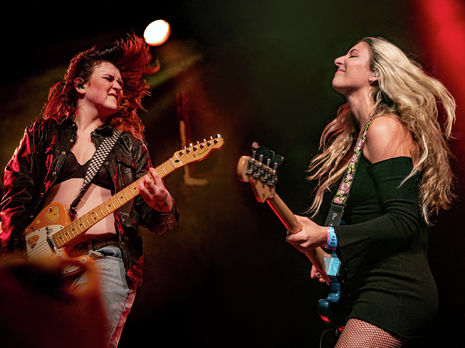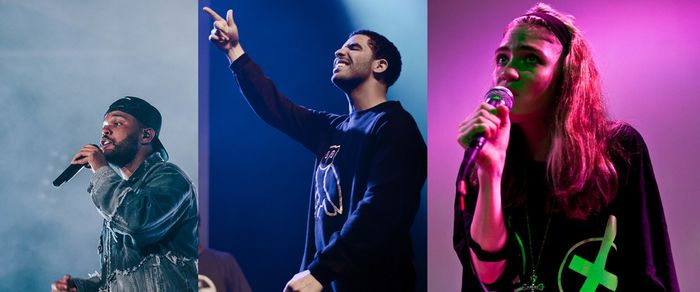Are influencers destroying the music industry?
Megan Conlon investigates how the new wave of influencers and the algorithms which promote them are shaping the music industry

Since the dawn of social media, influencers have had their foot in the door of the music industry. This hasn’t appeared to let in more than a light draught until the rise of the TikTok juggernaut. With this, there has come a new wave of influencers sharing short-form video content to the masses, working hand-in-hand with the advanced algorithms of TikTok and Instagram reels to reach as many people as possible. ‘Trendability’ is at the forefront of their success and they are well-versed in the art of keeping people’s attention for 15 seconds. The question is, though, have these influencers been able to use this success to creep in through the backdoor of the music industry?
“Have these influencers been able to use this success to creep in through the backdoor of the music industry?”
Of course, influencers making their own music is not a new phenomenon, though they have only been taken more seriously recently. Take, for example, the early-2010s era of parody songs, comedy songs, rap battles and diss tracks. Many of these gained huge popularity on the platform, but rarely had commercial success outside the YouTube sphere. That was until influencers’ more ‘serious’ songs began gaining traction. A major example of this is Troye Sivan, whose initial internet presence was covers of popular songs, before he embraced the more typical ‘Youtuber persona’ by following early trends and collaborating with huge names in the sphere like Zoella, Tyler Oakley and Miranda Sings. His first song, ‘Happy Little Pill’, went viral and in 2014 his debut EP, Trxye, went to number 1 in 55 countries on iTunes, prompting him to be signed to a record label. Since then, he has left YouTube to be a full-time musician, releasing two highly successful albums, the most recent of which – his 2023 release Something To Give Each Other – received a Grammy nomination for the lead single ‘Rush’.
Following in Sivan’s strides, the likes of Conan Gray and Lil Nas X have managed to graduate from the online sphere to have successful standalone careers. How can it be, then, that TikTokers are affecting the music industry when these older influencers seemingly caused little disruption? I find it difficult to criticise individual influencers for pursuing new mediums of creation, even if what they produce could have come from a child who just learnt about swearing. Who can blame them? Surely everyone has dreamt of being a popstar at some point, and if you have the funds and a pre-established fanbase, it’s understandable that you would want to give the microphone back to your childhood self.
“These almighty algorithms encourage a certain type of song: one with simple, relatable lyrics; one that is danceable; one with a beat drop”
Perhaps the real issue is not influencers at all, but the apps themselves. These almighty algorithms encourage a certain type of song: one with simple, relatable lyrics; one that is danceable; one with a beat drop which is just perfect for a before-and-after transition video. Just take a look at the success of Gayle’s ‘abcdefu’, Doja Cat’s ‘Say So’, and mxmtoon’s ‘Prom Dress’. It is these viral songs which have a wider impact on the music industry, as already-established artists are forced to become influencers themselves to promote their music via 15-second trends. Success on TikTok is success off TikTok. This has meant that many artists have resorted to making music for the algorithms, rather than a trend appearing organically. Look no further than Taylor Swift’s ‘Anti-Hero’; anyone can see that “It’s me. Hi. I’m the problem, it’s me” was intended to go viral among Gen-Z users, even if Swift’s own attempts to create short-form content has left her millennial status showing.
With the recent announcement that all artists under the Universal Music Group record label (including Taylor Swift, Ariana Grande, and Drake) will have their music removed from TikTok, it might be possible that these artists will no longer mould their music to the algorithm and return to other avenues of promotion. Nonetheless, independent artists will inevitably still fall victim to the algorithm’s whims, potentially bringing influencers’ attempts at making music to the forefront once more.
In general, the new wave of short-form content could be a positive thing; emerging artists can have their music specifically shown to like-minded people, rapidly expanding their fanbases. But for those who want to make a quick buck by putting out a shoddily-constructed song, they must only write what they know will go viral. When this mindset seeps into the wider industry, as we’ve seen, it has the ability to change the sound of pop altogether.
 News / Hundreds of Cambridge academics demand vote on fate of vet course20 February 2026
News / Hundreds of Cambridge academics demand vote on fate of vet course20 February 2026 News / University Council rescinds University Centre membership20 February 2026
News / University Council rescinds University Centre membership20 February 2026 News / Judge Business School advisor resigns over Epstein and Andrew links18 February 2026
News / Judge Business School advisor resigns over Epstein and Andrew links18 February 2026 News / Petition demands University reverse decision on vegan menu20 February 2026
News / Petition demands University reverse decision on vegan menu20 February 2026 News / Caius students fail to pass Pride flag proposal20 February 2026
News / Caius students fail to pass Pride flag proposal20 February 2026










